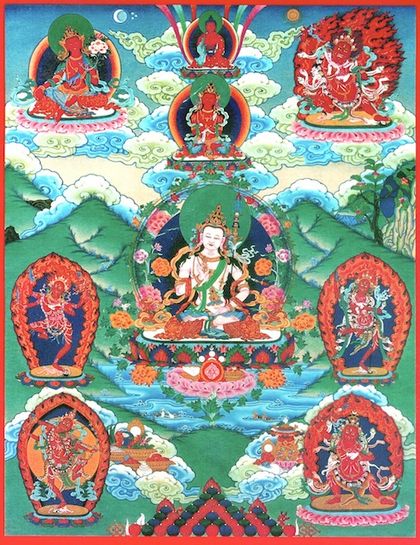Wangdü: Difference between revisions
No edit summary |
No edit summary |
||
| Line 8: | Line 8: | ||
*Above are [[Vajradharma]] (Tib. ''Dorje Chö'') and, at the top, [[Amitabha]]. | *Above are [[Vajradharma]] (Tib. ''Dorje Chö'') and, at the top, [[Amitabha]]. | ||
*[[Avalokiteshvara]], as [[Padmapani]], and [[Hayagriva]] are top left and right. | *[[Avalokiteshvara]], as [[Padmapani]], and [[Hayagriva]] are top left and right. | ||
*The two [[dakini]]s, [[Guhyajñana]] and [[Vajravarahi]], are on either side of Pema Gyalpo. | *The two [[dakini]]s, [[Guhyajnana|Guhyajñana]] and [[Vajravarahi]], are on either side of Pema Gyalpo. | ||
*[[Kurukulla]] and [[Döpé Gyalpo]] are in the bottom left and right corners. | *[[Kurukulla]] and [[Döpé Gyalpo]] are in the bottom left and right corners. | ||
Revision as of 10:24, 13 June 2016

Wangdü (Tib. དབང་སྡུད་, Wyl. dbang sdud) is the common abbreviated title of the prayer by Mipham Rinpoche called The Great Cloud of Blessings: The Prayer which Magnetizes All that Appears and Exists (སྣང་སྲིད་དབང་དུ་སྡུད་པའི་གསོལ་འདེབས་བྱིན་རླབས་སྤྲིན་ཆེན་, snang srid dbang du sdud pa'i gsol 'debs byin rlabs sprin chen). It was written in 1879.
Prayer Flag
The prayer flag contains both images and prayers. In the prayer flag flown at Rigpa centres the images are of the deities mentioned in the prayer and are based on a print of a thangka given to Sogyal Rinpoche by Khenpo Jikme Phuntsok (Khenpo Jigphun). Khenpo Jigphun flew many Wangdü prayer flags around his monastery. Previously this prayer flag was not widely distributed and was considered secret or, perhaps, personal.
- The central deity is Pema Gyalpo portrayed in Sambhogakaya form.
- Above are Vajradharma (Tib. Dorje Chö) and, at the top, Amitabha.
- Avalokiteshvara, as Padmapani, and Hayagriva are top left and right.
- The two dakinis, Guhyajñana and Vajravarahi, are on either side of Pema Gyalpo.
- Kurukulla and Döpé Gyalpo are in the bottom left and right corners.
Normally mantras and prayers are the main feature of prayer flags, rather than images, so it is the prayer that is the main thing, as it says in the text.
Recently this image has been printed in the Rigpa Calendar, following advice that this would be beneficial.
Usually it is printed on red cloth.
Commentary
- short commentary by Khenpo Namdrol.
- long commentary by Metrul Tenzin Gyatso, a student of Khenpo Jikmé Phuntsok.
Teachings on Wangdü
- Alak Zenkar Rinpoche, Lerab Ling, 17 June 2009
- Sogyal Rinpoche, Lerab Ling, 1-2 June 2009
- Sogyal Rinpoche, Lerab Ling, 17 August 1996, 12:00